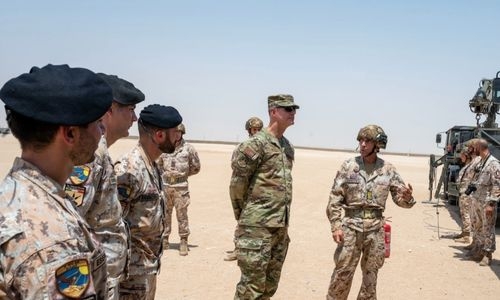Iran offering advanced arms to Mideast proxies
TDT | Manama
The Daily Tribune – www.newsofbahrain.com
Tehran regime is offering advanced weapons to its proxies in the region, threatening the overall security of the Middle East, said US Air Forces Central (AFCENT) Commander Lieutenant General Alexus G Grynkewich. This came as Lt Gen Grynkewich held an on-the-record press briefing attended by journalists from Bahrain on Sunday.
“Iran with a network of partners does threaten regional stability. But the provision of those partners and proxies with advanced conventional weapons, and then Iran’s ability to control those partners and proxies either for their own ends or their inability to control them has led to the creation of armed groups that have advanced weapons they can use in destabilising ways that no one really has control of. “It’s something that is clearly a concern here.
So Iranian behaviour in the region, primarily driven by its designs for regional hegemony, are another issue that has – that is certainly challenging here for us,” he pointed out. Lt Gen Grynkewich highlighted the significance of the 90-day assessment carried out by US Central Command Commander Erik Kurilla, adding that it lay emphasis on violent extremist organisations in the region.
“They exist all over the world, of course, but some here have been sort of the ones that have been more aggressive in attacking our shared values and our shared systems of government, starting all the way back before September 11th with Al Qaeda.
And certainly we saw the scourge of ISIS as they grew and expanded across Iraq and Syria and Levant. “And those are something that all of us collectively, whether we live here in the region, whether we work here or whether we come from afar, have an interest in countering and keeping under wraps.”
Gen Kurilla came up with a strategy for addressing the longer-term challenges that we collectively face, he said. “And I use the word ‘collectively’ intentionally in that his main approach is all about regional partnership and it’s about partnerships over posture and thinking about how we strengthen our relationships in military-to-military space with those in the region that share our views of what regional stability ought to look like and how we can collectively work against common threats.”
Lt Gen Grynkewich said he has lined up his priorities as the serving Commander of US Air Forces Central. “The first one is about valuing the contributions of our coalition partners, valuing the contributions of our soldiers, sailors, airmen, and Marines, base force numbers that are in the air component, that assist us on a daily basis with getting our mission done.
“We value the contributions of everyone on the team, which includes a whole host of coalition officers from the region and from outside the region here at my headquarters. Then we’ll be able to innovate, capture all the ideas that they have, come up with some new ways of solving problems, and that then allows us to partner, and that’s the third point.
“So we value, we innovate, and then we partner for strength with other nations in the region. Again, our – the air forces in the region, the air defense forces of the region, and drive the partnership both bilaterally and multilaterally together to better defend ourselves – again, largely based on shared understanding and sharing information and intelligence. “And then, lastly, we want to prevail. We want to prevail in our fight against ISIS that many of us have been involved in, certainly since 2014, and we want to prevail, again, in becoming that partner of choice here for everyone that we have longstanding historic relationships with.”
On targeting threats from the part of IS and other insurgents, he said CENTCOM certainly has and AFCENT certainly has adequate forces in the region to continue the fight against ISIS. “We have adequate forces in the region to defend ourselves as required.
There’s been an intentional vision to maintain that sufficient level of forces here, and that’s because we know again that, if you go back to my opening comments, the threats from violent extremism, the destabilising activity that we see from Iran, and the need to continue to work with our partners in the region doesn’t go away just because there’s something else going on, something very important going on in another area.”
Related Posts

